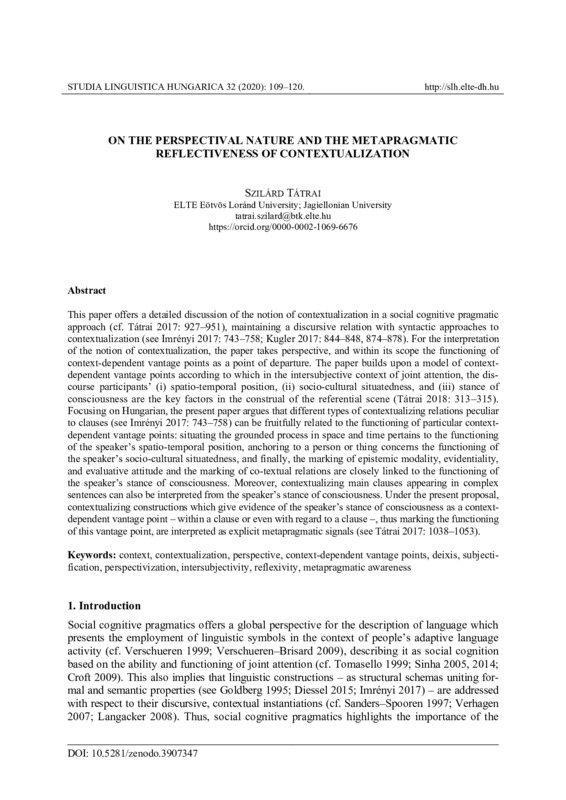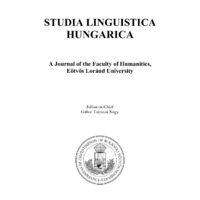Elemkészletek
Cím
eng
On the perspectival nature and the metapragmatic reflectiveness of contextualization
Szerző
Folyóiratszám
Kiadó
Eötvös Loránd University, Faculty of Humanities See all Elemek with this value
Kiadás éve
2020
Kiadás helye
Kezdőoldal
109
Utolsó oldal
120
Nyelv
Azonosító
Tárgyszó
eng
context
eng
contextualization
eng
perspective
eng
context-dependent vantage points
eng
deixis
eng
subjectification
eng
perspectivization
eng
intersubjectivity
eng
reflexivity
eng
metapragmatic awareness
Dokumentumtípus (Getty AAT)
Tudományterület (Getty AAT)
Absztrakt
This paper offers a detailed discussion of the notion of contextualization in a social cognitive pragmaticapproach (cf. Tátrai 2017: 927–951), maintaining a discursive relation with syntactic approaches to contextualization (see Imrényi 2017: 743–758; Kugler 2017: 844–848, 874–878). For the interpretation of the notion of contextualization, the paper takes perspective, and within its scope the functioningof context-dependent vantage points as a point of departure. The paper builds upon a model of context-dependent vantage points according to which in the intersubjective context of joint attention, the dis-course participants’ (i) spatio-temporal position, (ii) socio-cultural situatedness, and (iii) stance of consciousness are the key factors in the construal of the referential scene (Tátrai 2018: 313–315). Focusingon Hungarian, the present paper argues that different types of contextualizing relations peculiar to clauses (see Imrényi 2017: 743–758) can be fruitfully related to the functioning of particular context-dependent vantage points: situating the grounded process in space and time pertains to the functioning of the speaker’s spatio-temporal position, anchoring to a person or thing concerns the functioning of the speaker’s socio-cultural situatedness, and finally, the marking of epistemic modality, evidentiality, and evaluative attitude and the marking of co-textual relations are closely linked to the functioning of the speaker’s stance of consciousness. Moreover, contextualizing main clauses appearing in complex sentences can also be interpreted from the speaker’s stance of consciousness. Under the present proposal, contextualizing constructions which give evidence of the speaker’s stance of consciousness as a context-dependent vantage point –within a clause or even with regard to a clause –, thus marking the functioning of this vantage point, are interpreted as explicit metapragmatic signals (see Tátrai 2017: 1038–1053).


